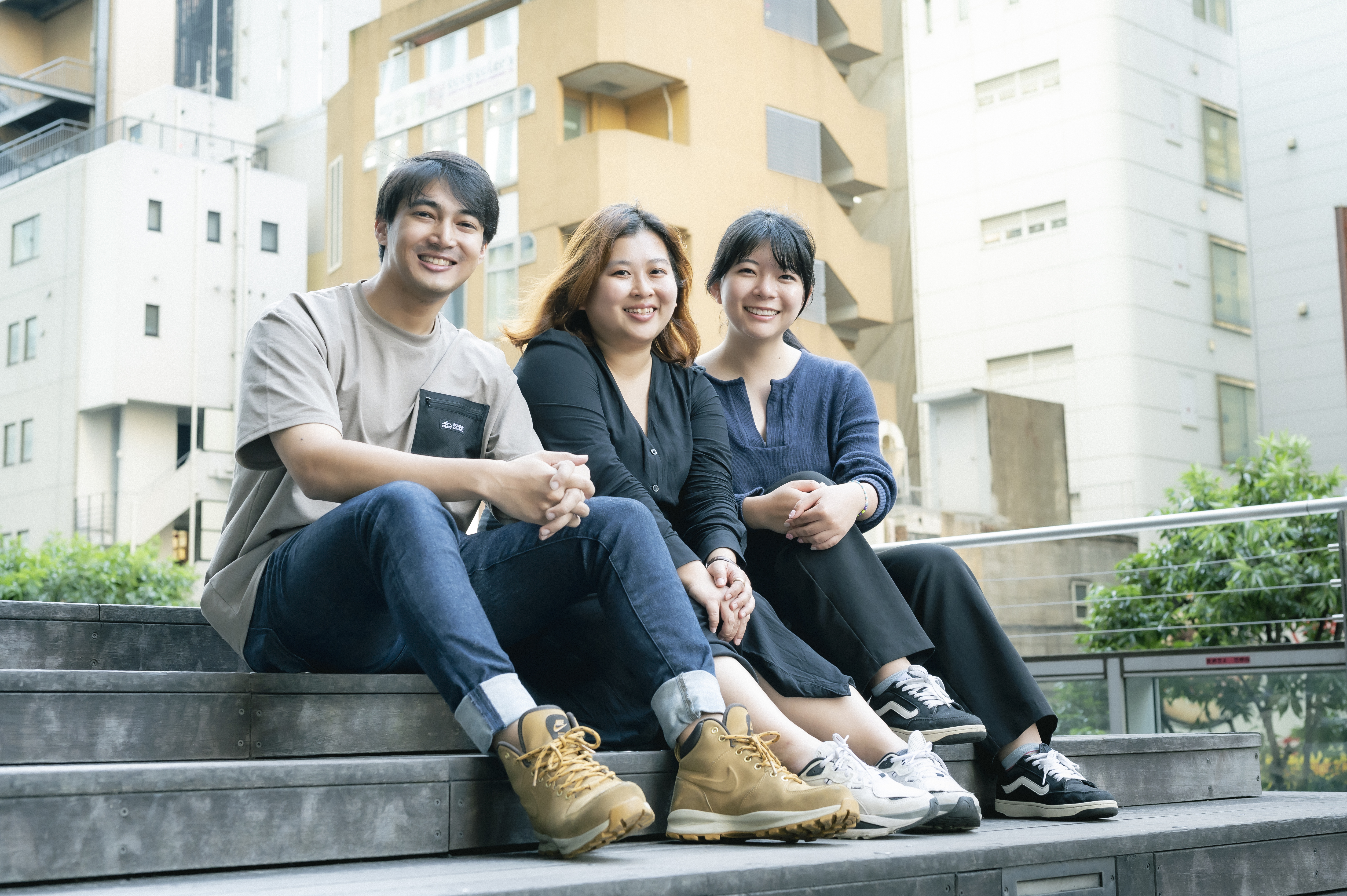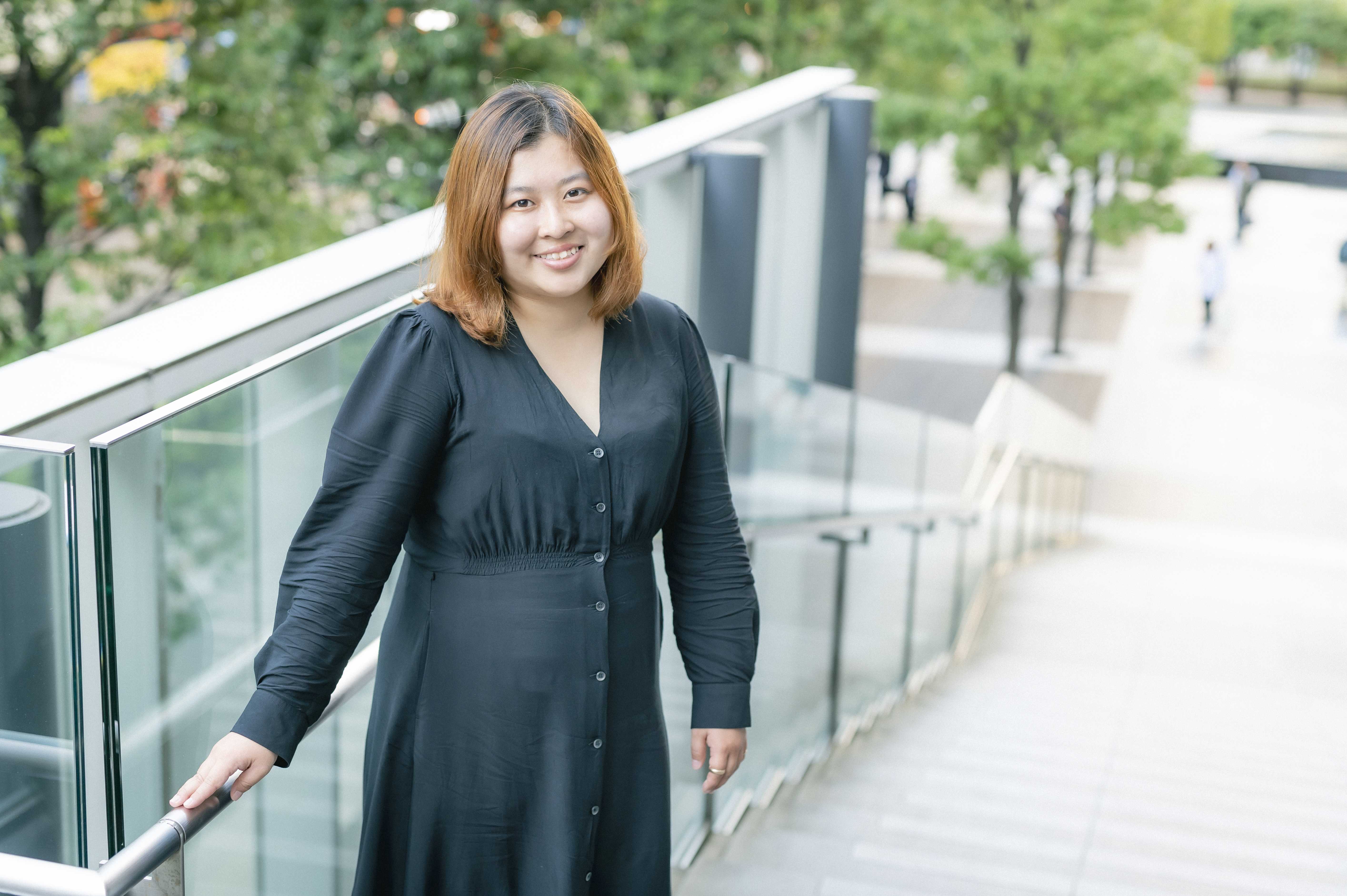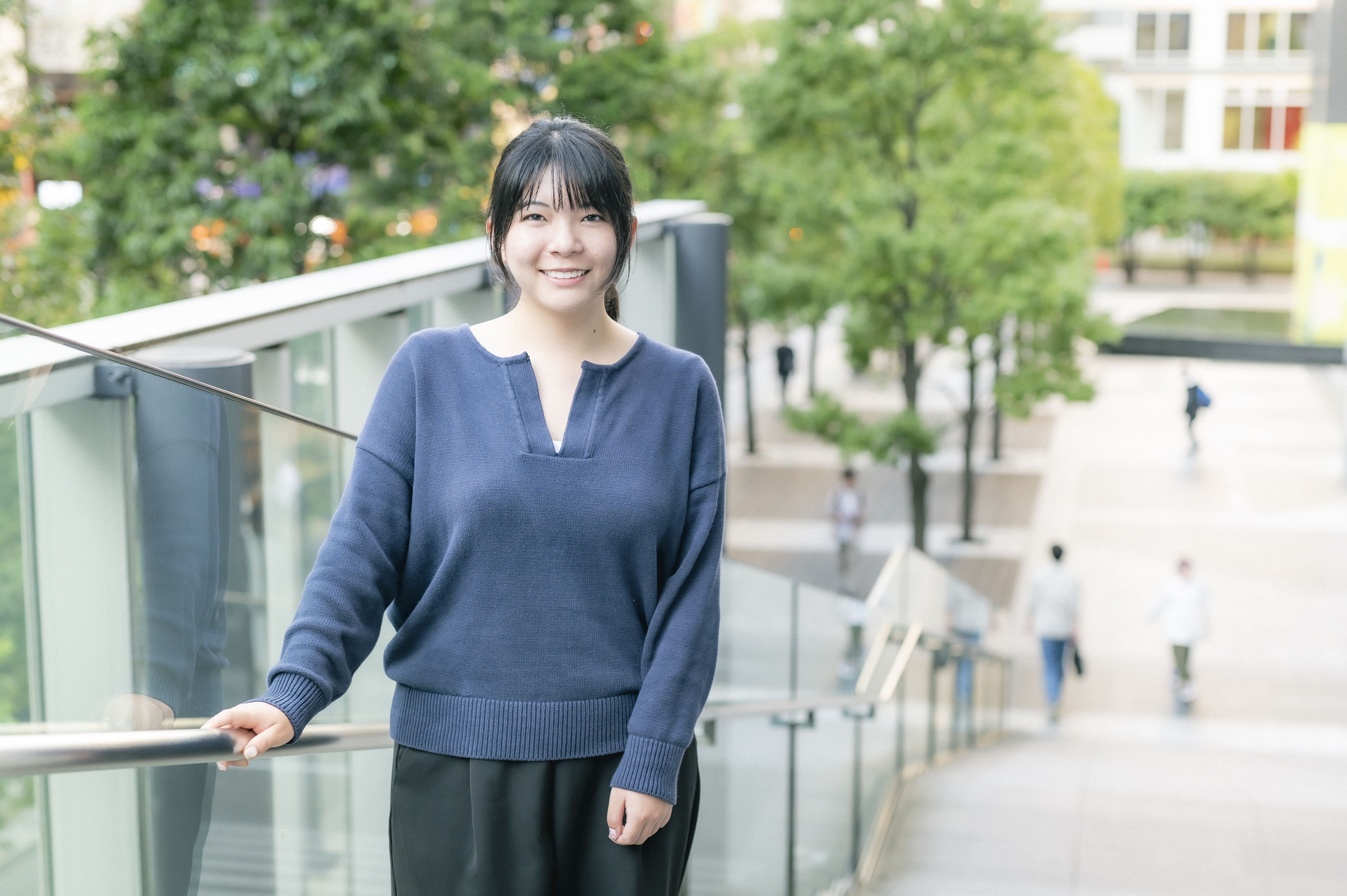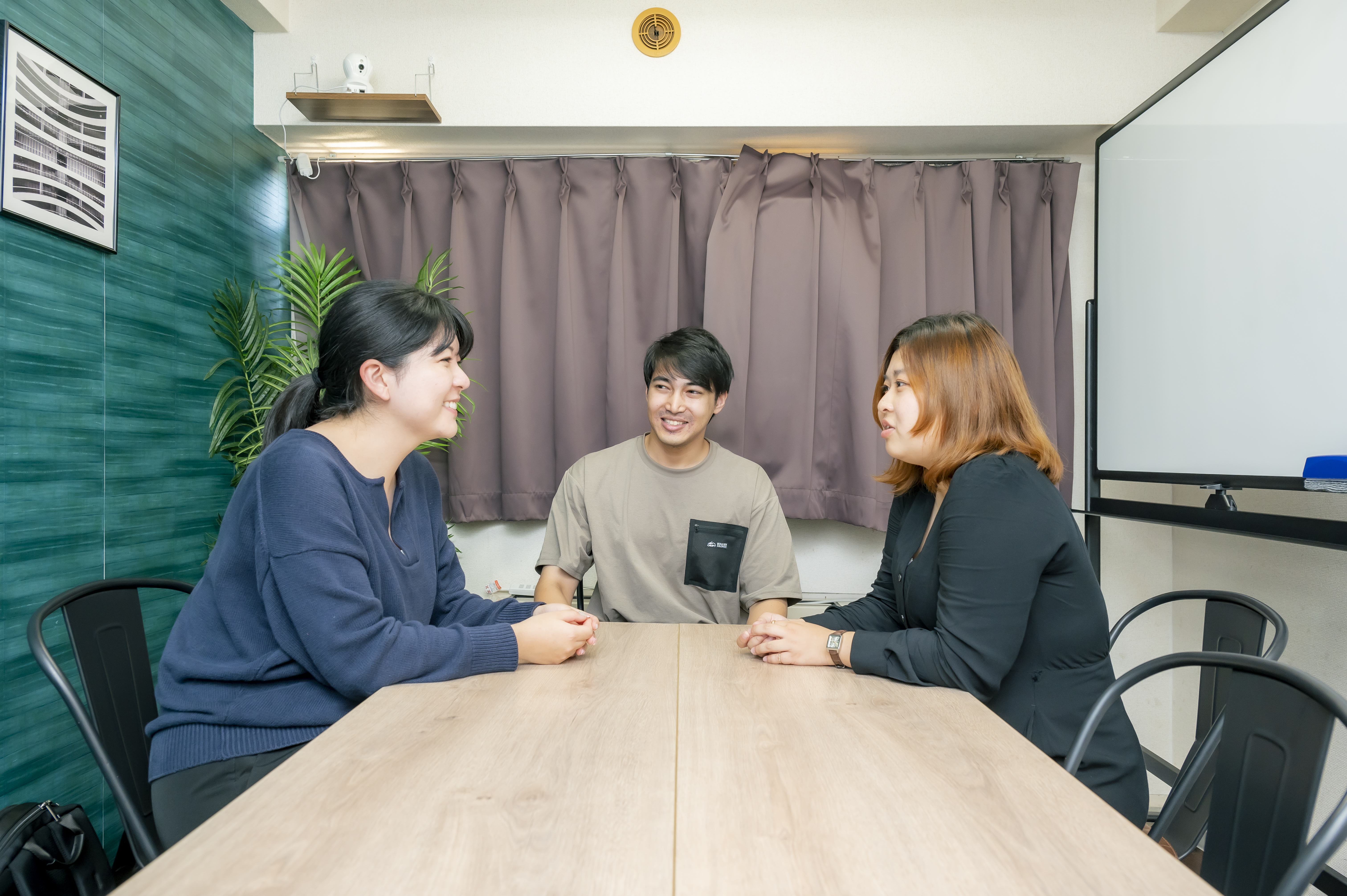Intercultural Crosstalk
A Conversation With Young People Connecting Japan to the World -About Language-

Profiles
Sabrina (from Peru)
- Years of residence in Japan
- 17 years
- Native language
- Spanish・Portuguese (Japanese is now my best language)
- Favorite Japanese words
- kawaii (cute)
- Favorite places in Tokyo
- Machida Station Carillon Square
- Favorite food
- Ice cream
- Hobbies
- Mountain climbing, outdoor activities
- Favorite music or song
- Hip-hop, Latin music
Yuko(from Taiwan)
- Years of residence in Japan
- 8 years
- Native language
- Japanese and Chinese (traditional)
- Favorite Japanese words
- The hawk that knows best hides its talons (Japanese proverb)
- Favorite places in Tokyo
- Along the Sumida River
- Favorite food
- Hamburger steak
- Hobbies
- Karaoke
- Favorite music or song
- LOVE PHANTOM by B'z
Pragyan(from Nepal)
- Years of residence in Japan
- 10 years
- Native language
- Nepali
- Favorite Japanese words
- "Shō-sho omachi kudasai (Please wait a moment)" (I first learned this when I worked part-time at a convenience store. I like it because it's a convenient phrase.)
- Favorite places in Tokyo
- Harumi
- Favorite food
- Curry
- Hobbies
- Research
- Favorite music or song
- Killer-Tune by Tokyo Incidents
Round 1: About Language
We are pleased to present a three-part series of round-table discussions with young people who have overseas connections.
This time, we asked three young people who became friends in their 20s to speak in a relaxed atmosphere. Although they now live in Japan, they have crossed borders and grown up in a variety of environments. What have they experienced, and how are they feeling now? In the first round, we talked about "language". Let's take a look at the cross-talk between the three as they reflect on their childhoods speaking different languages.
How Did You Learn Japanese?

My father is Japanese, so he would speak to me in Japanese, but as a child I could not speak Japanese, so I would respond in Chinese. My mother read to me in Chinese and my father in Japanese, so it was a bilingual environment. From the time I was born, Chinese and Japanese were both spoken in my family.
How did you learn to speak?
I started speaking Japanese when I entered a Japanese school in Taipei as an elementary school student. Before that, everything was in Chinese.
I was born in Japan and returned to Nepal when I was about two years old. According to my mother, l returned to Japan in the second grade, and for the first two or three months, I attended Japanese language classes at the city hall after school.
So that is where you learned to speak Japanese.
Yes, that's right. I don't remember coming back, but I do remember talking in Japanese with everyone at school.
That was fast.
Perhaps children learn things faster. I was back in Japan for two years until fourth grade, then returned to Nepal. When I returned to Japan again, as a high school student, I remembered some Japanese and could understand what I heard, but I couldn't speak. It was a valuable experience for me to learn Japanese once, forget it, and learn it again.
I came to Japan from Peru when I was 10 years old and my Japanese language skills were zero. I moved from Toyama to Fukuoka and Kanagawa Prefecture without being able to attend school. I first entered school in the third semester of fourth grade. I couldn't learn Japanese because there was no one to teach me, so I was almost entirely self-taught in Japanese. I was bullied at the first school I attended, so I developed selective mutism, which meant I could speak up at home but not at school. I was afraid to speak in front of people. I could speak little by little, but I could only speak in the textbook keigo (honorific speech), and I think people thought I was weird.
In what grade did you learn to speak as well as the others?
I was in high school. Until junior high school, I was afraid of people hearing my voice speaking Japanese. I had always been thought of as a child who could not speak Japanese, so if I suddenly spoke it, they might say I was creepy or something. In high school, the environment changed, and not many people knew me, so I thought, that's enough, I can speak now.
What Language Did You Speak With Your Family?

My father and mother spoke Chinese, and I spent most of my early childhood conversing with my parents in Chinese. I entered a Japanese school in Taipei from elementary school and learned Japanese, but it was not until I was in third grade that I was able to speak fully in Japanese with my father. Before that, it was partially Chinese.
Do you still mix both languages at home?
My parents married internationally and later divorced, so with my father I spoke only Japanese and with my mother only Chinese. They are in different places, so I don't mix the languages.
I speak a mixture of Spanish and Portuguese. In Peru, the country where I was born and also my mother's home country, is Spanish, while in my father's home country, Brazil, where I spent my childhood, it's Portuguese. When the two languages are mixed, such as in border towns, it is called "Portognol", and it happens in my home. My parents know each other's language because the two languages are similar, and they don't mind which language I speak.
I don't mix languages. It is absolutely Nepali in my house. When I was in elementary school, my sister was born in Japan and went to a Japanese preschool, so she could only speak Japanese. So we often fought because we didn't understand each other's language. After that, my sister went back to Nepal and forgot all her Japanese, so now she only speaks Nepali.
My brother was born in Japan and has been in Japan all his life, so he speaks only Japanese. He doesn't understand any Spanish or Portuguese, so he can't communicate with my parents. My parents do their best to speak a few words of Japanese, but when they want to talk to him about his career path, etc., I have to translate for them.
What Are the Strengths and Benefits of Speaking Multiple Languages, but Also, What Are the Difficulties?

I am majoring in International Education, and my research field is Japanese schools in Taiwan, where I started. I feel that I have an advantage when speaking to children whose parents, like me, are from international marriages, because I can communicate with them in Chinese. In Japan, I am glad that I have two languages because I can play a role as an intermediary for immigrant high school students from China, and I can use Chinese to connect societies.
I grew up with my mother telling me to at least not forget Spanish and Portuguese. I grew up with her always telling me that the more languages I speak, the bigger I become. I am trying my best to maintain my mother tongue, although it is at a daily conversational level.
The biggest advantage for me is that I can gather twice as much information speaking two languages. However, in my case, I am "forced" to maintain my native language. My parents want to instill the Nepali language and culture in me, but I personally don't think I need to maintain it. I see more and more Nepalese children being brought to Japan by their parents, but if they try to learn both Japanese and Nepali from an early age, it will be the children who will have a hard time. If they want to learn their mother tongue and culture, I think it is okay to do so after they have grown up to a certain extent.
I also feel the same way. Even though I myself am maintaining my native language, I am not trying to improve it, but at least I am doing my best not to lose it. There are children who came to Japan at an early age and learn two languages halfway through and become double-limited, and it is the children who struggle the most with this. Some of my classmates were unable to understand difficult words or write sentences. I think it is better not to learn another language until one language is established in your mind.
Do You Want Your Friends and Neighbors to Know About Your Roots?

When you speak more than one language, you feel like you have a different personality because of the characteristics of each language. Do you know this feeling?
Yes, yes, I know what you mean!
It's like having a totally different personality within myself.
Yuko in Chinese and Yuko in Japanese. I am lucky because I can have both.
Do you two want your friends and people around you to know about your roots?
I would prefer people to know my roots. After all, there are parts of Japanese culture that I don't understand. I had been back in Nepal for a while, so there are some things that are missing. For example, I sometimes have trouble following conversations about baseball or what everyone was doing in junior high school. I think it would be good for them to understand that I don't know those things.
When people talk about the old days and say, "This used to be popular back then," I usually say, "I was not in Japan back then, so I don't know about it. I'm actually from Peru". When I tell them that I am from Peru, they are usually surprised. I tell them first so they will understand.
I am similar to Sabrina in that I am aware that if I don't tell them, they won't realize I am a half-Japanese, and I tell my story. I went to Japanese school for 9 years, so I know what is popular in Japan, and I was in an environment where I could live somewhat like in Japan, so if I didn't tell people, they wouldn't know I grew up overseas.
I tell people about my roots because I want them to know that there are people who are connected to Japan in more diverse ways.
How did you like our “Conversation With Young People Connecting Japan to the World”? This month, they talked about "language”. As the number of children who travel back and forth between countries and come to Japan for family work or other reasons is increasing every year, there is a lot of discussion about Japanese language instruction and mother tongue education for these children. These young people, who have grown up with different languages since their childhood, were very informative, and at the same time, they showed that it takes a lot of effort to learn a language different from one's mother tongue.
The young participants, who have grown into their 20s, shared many solid opinions of their own at the roundtable.
We will be back next time with a new conversation about "School and Further Education".
── Continued in the Following Issues
